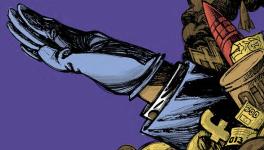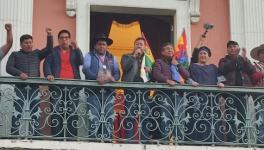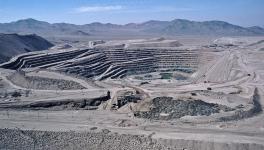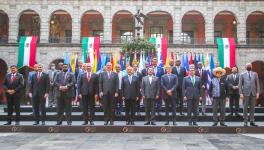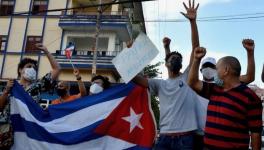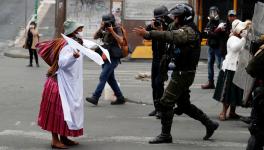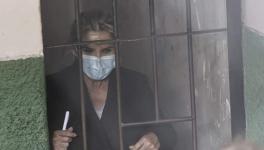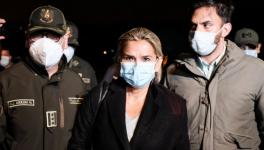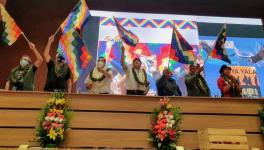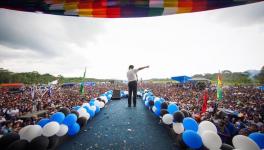How the Bolivian People Defeated the Coup
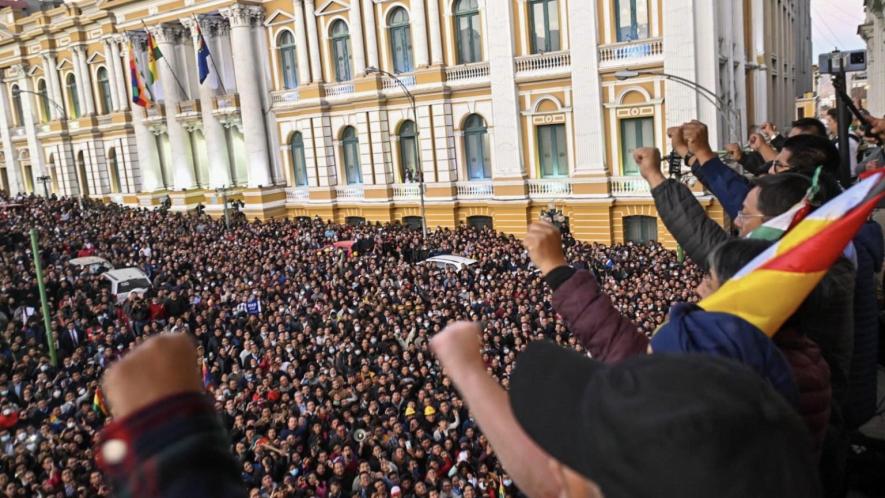
Bolivian President Luis Arce addressing crowds of people in Plaza Murillo after the coup was defeated. Photo: Luis Arce
On Wednesday June 26, hundreds of members of the Bolivian Armed Forces had mobilized under the order of General Juan Zúñiga in the center of La Paz and surrounded the Quemado Palace, attempting to stage a coup d’état. Their attempt was quickly diffused by a combination of the swift response from Bolivian President Luis Arce to replace the leadership of the military, an immediate and unanimous condemnation by the international community, and most importantly, the overwhelming mobilization of the Bolivian people to the center of La Paz to defend their democracy.
TeleSUR journalist Marcela Heredia spoke with former Minister of the Interior, economist, professor and Bolivian analyst, Hugo Moldiz, who with Heredia, analyzed the events of the day that ended in the failure of the attempted coup against the constitutional president Luis Arce.
Marcela Heredia: Let’s talk about what is considered “a successful management of the defense of democracy in Bolivia”. What is your analysis of this?
Hugo Moldiz: I believe that several factors came together so that democracy and the legally constituted government did not suffer a coup d’état by some military officers. The first was the attitude of President Luis Arce: he did not leave. Arce stays, confronts, faces the coup general and orders him to retreat. The general said no, but that did not discourage Arce’s attitude and the firmness with which he faced the situation. Second, the rapid response of the people who moved by the thousands towards the seat of government, towards the Casa Grande. In the Murillo square there were some clashes with the military -happily without casualties on the civilian side and neither on the military side- but there were no confrontations. Third, the quick reaction of the international community: from progressive leftist governments, to the OAS itself, even some right-wing presidents.
Fourth, the impossibility -as Freddy Morales (of TeleSur) has pointed out- of Zuñiga’s ability to coordinate other units and regiments in time. At 12:30 pm he gives the order for military personnel to get ready, that happens effectively -all of them in the country got ready without knowing the reason-. However, already when General Zúñiga takes Murillo square, the Eighth division, for example, which remains in the Bolivian East in Santa Cruz, decides not to join the coup adventure. The same happens with the Seventh division – which is stationed in Cochabamba – and the same happens with Challapata – where there are these heavy and assault vehicles – they decide not to join. They practically leave it alone. I would say that an additional factor is -although it changes later- the rejection of sectors, even from the opposition, to a coup d’état in Bolivia.
MH: When these denunciations shared by President Arce of irregular mobilizations in some units of the Bolivian Army first appeared, the media was at the scene and showing this take place. What impact did having the media on the ground have on the Bolivian people who went out and defended their democracy?
HM: I would say that there was an apparent neutrality in many media. In any case, it serves as a mechanism that goes in favor of President Luis Arce. There is still a lot to weave in there: to find out if this apparent neutrality really was or not. I believe that at the beginning there is a kind of imprecision in the government when it says that there is an unusual movement of troops. Minutes later the situation would lead the government itself to quickly rectify this and denounce the coup attempt. There are a series of facts, Marcela, which disprove, for example, the self-coup thesis: we must remember, especially in Venezuela, that when the coup against Chávez fails, sectors of the opposition try to install the self-coup thesis in view of the failure of a plan to overthrow the chavista revolution. Understanding the difference of distance, time, of course, and characters: we are in a scenario of this nature. I have a hypothesis, Marcela, and it is that the attempt to shorten President Arce’s term in office has not been concluded. The ways for that shortening are going to be different: yesterday we saw one of them but that does not mean that other ways will not appear in order to achieve the objective of bringing forward the general elections.
MH: That is precisely why it is important to talk about this phrase that was heard yesterday in the square, once the people arrived, and that is “Lucho is not alone, dammit! This is a concept that is very important to emphasize because finally it is the pronouncement and the decision taken by the people of Bolivia to stand by their president and to protect the institutionality, Hugo.
HM: Yes, the quick reaction of the people was fundamental, as well as the attitude of the President. I would say that even people who may not have voted for Luis Arce and may not have gone to the Plaza Murillo, expressed and showed they are against a coup of this nature. In addition to the effects of it, people already experienced it in 2019 when President Evo Morales suffered a coup d’état and they used the mechanism of the resignation to say that there was no coup, when there was a coup d’état against President Evo Morales. Just as yesterday there was an attempted coup d’état against Luis Arce, which unfortunately is being questioned by some people who are associated with the former president. I do not believe that they are not making an objective reading because behind this project there is evidently still a lot to be investigated: I do not believe that General Zúñiga attempted a coup d’état just because he was told 24 hours before that he was going to be relieved of his position. No, no, that is not organized overnight. I think that the statement he made, 48 hours before, against Bolivian democracy, even against former President Morales -whom he said that if he could, he would stop him, something that the armed forces cannot do except in times of exception regimes- is where the coup project that finally failed yesterday, to the happiness of the Bolivian people, begins to be unveiled.
(1/1) La democracia ha prevalecido en Bolivia, pero debemos mantenernos alertas por el bien de nuestro país y de las futuras generaciones.
Solicitamos a la Justicia Ordinaria y la Justicia Militar que juzgue con todo el rigor de la ley al General Zúñiga y a todos los responsables pic.twitter.com/O2rHIB72MD— David Choquehuanca (@LaramaDavid) June 27, 2024
MH: There is a statement by David Choquehuanca: “Democracy has prevailed in Bolivia, but we must remain alert for the good of our country and of future generations”. So you are completely in line with what the government authorities in Bolivia think from your analysis, Hugo. “We request,” says Choquehuanca, “the ordinary justice and the military justice to judge General Zúñiga and all those responsible with the full rigor of the law in order to avoid any future coup d’état attempt. We thank the entire population, social organizations, mayors and the international community for defending the democracy that cost us so much to recover.” We are talking about a key figure, today vice-president of the Plurinational State of Bolivia, but who together with Evo Morales and thousands and thousands of other Bolivians have worked and are working from the political sphere for Bolivia’s democracy. So, Hugo, I invite you to please explain this post made by Choquehuanca -who is also a very respected man in the international political scenario due to his trajectory and the time he has worked in public organizations.
HM: We have to look at the situation as a whole, not the particular event of yesterday. President Arce is facing a virtual harassment, a virtual blockade, especially coming from the legislative sphere and a still preliminary articulation of different social forces -when I speak of social forces I am talking about some sectors of the peasant movement, unfortunately, sectors of heavy transport, trade union sectors, it is said that from behind also several business sectors- that what they are doing is increasingly encircling him, in such a way that President Arce has no other alternative but to bring forward the elections. I fully agree with what the Vice President says: yesterday we have lived an episode of a chapter that has not yet concluded, it will depend on how the government reacts, on how to make very quick adjustments in the management, in the group of collaborators accompanying the President and how it manages to consolidate political relations with a wide sector of the popular camp to be able to thwart the danger that still lurks in the Bolivian democracy.
This article was published in TeleSur and translated by Peoples Dispatch to English.
Get the latest reports & analysis with people's perspective on Protests, movements & deep analytical videos, discussions of the current affairs in your Telegram app. Subscribe to NewsClick's Telegram channel & get Real-Time updates on stories, as they get published on our website.









